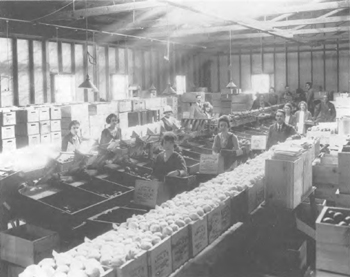News & Events More |
1922: The Year of Red InkWartime prosperity came to an end in 1921, as the enormous number of apple trees planted in the boom years of 1910 to 1913 came into full bearing, and the distribution system proved unable to handle the sudden jump in supply. The Okanagan apple crop of 1920 was 1,317,000 boxes; that of 1921 increased by over a million boxes to 2,769,000. Fortunately, the United States crop of 1921 was very small, and gave no competition on the Prairies. Even so, the combination of reduced public buying power from the recession of 1921 and the large crop caused the breakdown of the Traffic and Credit Association as various shippers reneged on their agreements and in their panic flooded the market with fruit. Okanagan United Growers, holding about a third of the total crop, attempted to maintain the agreements and stabilize the market; as a result, the cooperative was able to sell only 324 of its 1287 carloads of winter apples on the best-paying Prairie market, and had to send the rest to eastern Canada, the United States, and Great Britain for considerably lower returns. 
In 1922 the saving grace of a small American crop was missing. Production there was almost half again more than that of the previous year, and left a large surplus to be disposed of by export. The Okanagan crop itself was also increased. The result was a drastic overload of fruit. With their experience of the previous season's marketing difficulties, shippers refused to purchase fruit outright from growers, and would only accept it on consignment. With no limiting agreements among themselves, and no financial stake of their own in the fruit, the chief consideration of the shippers was to dispose of stocks on hand. Prices plunged on Prairie markets as agents tried to match each other's offers; jobbers were reluctant to make firm purchases, for fear that prices would drop further and leave them unable to sell at a profit. Both independents and cooperative "rolled" (shipped without an order from a jobber) large quantities of apples to the Prairies, hoping to find a buyer once there. This flood only served to lower prices further and demoralize the market. This tended to make jobbers and even retailers on the Prairies afraid to buy and willing to accept shipments only for sale on consignment. In overloaded markets much of the fruit was finally disposed of at very low prices or remained unsold and was lost. Aggregate returns were often insufficient to meet packing, transportation and agency costs. One result of the crop of 1922 was an enduring bitterness towards the shippers by many growers who had received only "red ink" for their apples-that is, bills from their shippers for packing and transportation costs which returns from the fruit had not even covered. And the growers grew to fear that the shippers would prefer to sell on consignment rather than by firm sale. For many years "consignment" was a dirty word in the Okanagan. Contact Us Hours: 9am - 4pm weekdays. t: 250-762-5226 |

